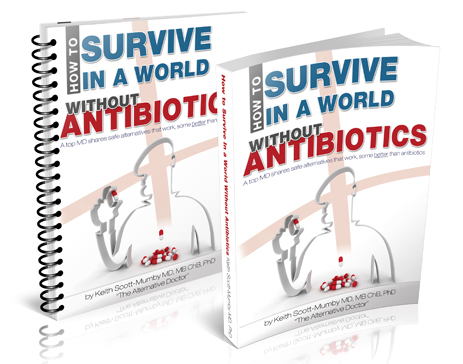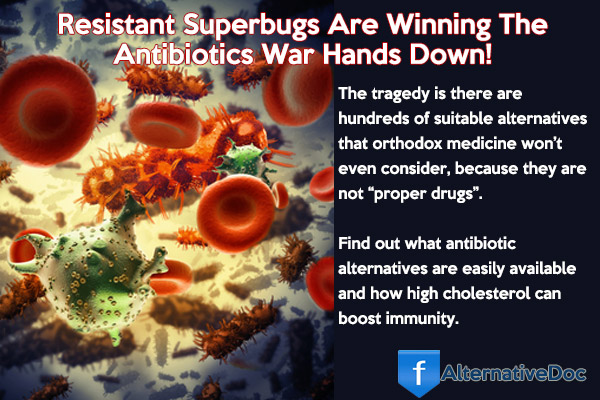I’ve been warning you for years now. Nemesis day is coming ever closer. There will soon be a time when millions die and we have to watch it, because antibiotics stopped working.
The tragedy is there are hundreds of suitable alternatives what orthodox medicine won’t even consider, because they are not “proper drugs”.
Who cares, if they work? And some work just as good (or better) than antibiotics, without all the side effects.
You might ask, what’s got Prof going on this?
A recent CBS report highlighted the fact MRSA, once called “the hospital bug” is now rampant in the community and running wild.
Already in the USA, as an example, 2 million people a year get drug-resistant infections and 23,000 die. That’s just a small proportion of the world’s population.
But where are they picking up the infections? That’s the creepy bit: their own homes. Bacteriologist forensics tracked 161 patients in the New York area and found that there was a “major reservoir” of MRSA in every home.
Yours too could be a reservoir, just waiting for the moment someone’s immune system takes a day off and… Boom! A nasty, potentially-fatal infection.
The trouble is that bacteria are not easy suckers, waiting to be picked off. They are life forms and want to survive just as much as we do. Moreover, they are very cunning and evolve new genes all the time. New genes can mean a pathway that is immune to clobber by antibiotics. Bang… a new resistant bug is on the loose.
I’ve said before in my writings that one single bacterium doubles every 20 minutes and in 24 hours can fill a bucket. The only thing that stops us being under 6 feet of deadly bacterial slime all over the surface of this planet is the question of food supply. The one thing that can slow them down to manageable proportions is that they have to feed, like us.
While the “scientists” are screwing around looking for newer antimicrobial drugs, the smart segment of the population settles down to learn about the abundance of antimicrobials that Nature has provided us with.

For example: there are 5 different types of mushrooms, hundreds of herbs, 3 key vitamins, 2 forms of milk, 3 deadly inorganic substances (forms of oxygen and safe-to-swallow acids), a type of honey, an extract of tea (proven better than vancomycin), two types of light and several electrical devices with bio-friendly waves) that are safe and superior antimicrobials that your body will love.
You just have to learn them. It’s smart to go to bacteria-school or even anti-microbial university! You are your loved ones will be glad of your knowledge one day.
It’s easy to learn and play to win: you just need a copy of my superb manual, “How To Survive In A World Without Antibiotics”.

More Evidence Links Higher Cholesterol With Improved Immunity
I’m grateful to Dr. John Briffa (UK) for calling my attention to 3 studies which appear to demonstrate what I’ve been teaching for nearly 40 years: cholesterol is NOT bad for you. Oxidized (rancid) cholesterol is certainly dangerous; that’s what we need antioxidants for… to stop oxidation of cholesterol, among other things.
Despite all the broohahah about the perils of cholesterol, there is good evidence to the effect that higher cholesterol levels are linked to improved health outcomes and/or longevity in the elderly.
Moreover there are NO convincing studies showing that saturated fat is bad, despite what you have heard over the years.
It’s all, basically, propaganda and it will kill you if you listen.
We want higher cholesterol not lower. We need it and our livers make it, whether or not. We need saturated fat of all kinds, because that’s what animals do. They are made up with saturated fat.
It’s natural. It’s healthy. I’ve told before: in the old days when everyone drank milk, with lashings of cream, slathered unadulterated butter and ate curds and cheese, coronary heart disease was virtually unknown.
But it appears that cholesterol is involved in protection against infection, too. Like Dr Briffa, I’m supposed to say a correlation between the two doesn’t prove that cholesterol is the reason. But I’m forced to tell you that’s how they get all their sleaze-science propaganda through; somebody finds an association and it’s blurted all over the press that one causes the other.
Come on, there cannot be one rule for them and one for us.

What is Bad Cholesterol?
We are told over and over that LDL is the “bad” cholesterol. But consider this: mice with high LDL-cholesterol levels were found to be significantly less prone to death after injection with bacteria compared to mice with lower cholesterol levels.
A very current study (Apr 2014) looked at the relationship between cholesterol levels and outcomes in individuals critically ill with an infection and found that, overall, those who died had significantly lower levels of cholesterol compared to those who survived. Again, this sort of evidence does not provide the cholesterol confers benefit. However, it does at least support the idea that cholesterol might have some genuinely protective role.
Another recent study found similar results in individuals undergoing cardiac surgery. The higher someone’s cholesterol was, the lower their risk of succumbing to an infection after surgery. For those with the lowest cholesterol levels, rate of infection approached 20 per cent. For those with the highest cholesterol levels, rate of infection was zero.
It makes you think.
Here’s one more: a 2005 study compared the role of cholesterol in immunity in patients with TB. This study took 21 individuals who had confirmed infection with tuberculosis. All of the individuals were treated with standard TB medication (four antibiotics taken in combination) over a period of 8 weeks.
10 participants were given a diet with 800 mg of cholesterol a day (that’s quite a lot: about the amount found in 5 medium-sized eggs). The rest of the participants ate a diet containing less than 1/3rd that amount: just 250 mg of cholesterol each day.
After only two weeks of treatment, 80 per cent of those eating a high-cholesterol diet were free of TB infection, compared to only 9 per cent of the others. This difference was statistically significant.
Again, I’m supposed to say this may not be proof of cause. Maybe there was other good stuff in a diet rich in butter, beef liver and egg yolk. Overall, though, I agree with Dr Briffa, which is that the evidence does seem to point to cholesterol conferring immune benefits and this may explain the definite link between higher cholesterol levels and improved longevity in later life.
Also remember: fat in your diet is good, I’m telling you, but fat round your waistline is deadly!
